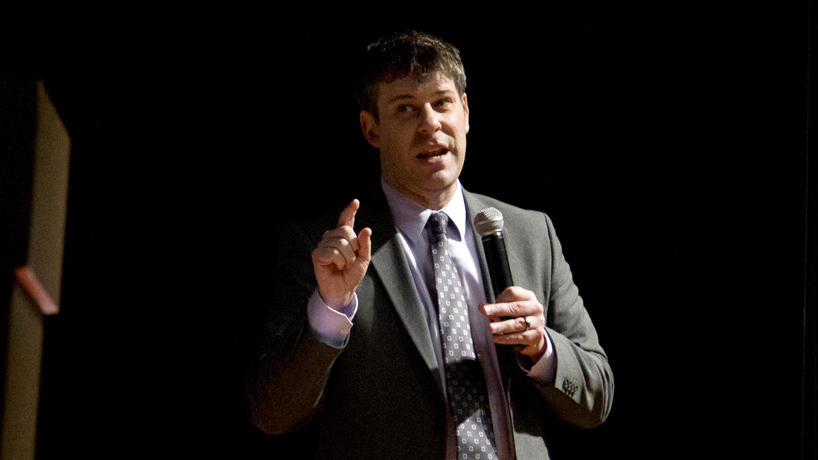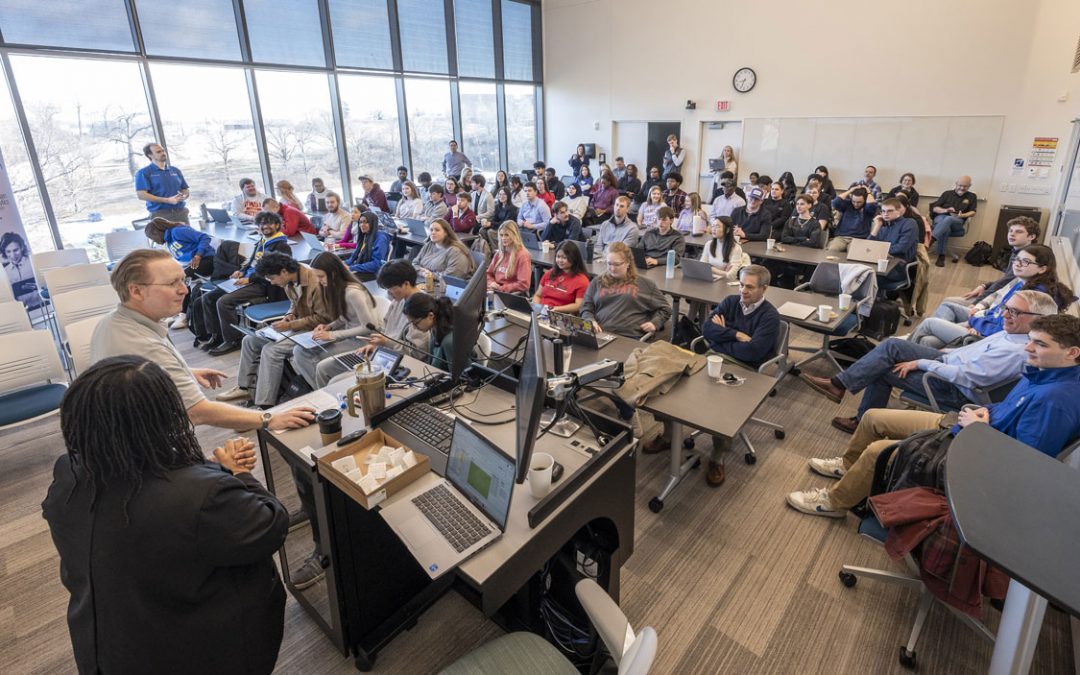
UMSL alumnus Ryan Barker, MPPA 2006, discusses the Affordable Care Act last month during a lecture that’s part of the Hellen and Will Carpenter Series on Contemporary Issues in American Society. (Photo by August Jennewein)
St. Louis native and University of Missouri–St. Louis alumnus Ryan Barker always knew he wanted to work in health care, though it took some time for him to figure out specifically what he wanted to do in the field.
After graduating as a premed student from Xavier University in Cincinnati, Barker deferred medical school to go to Portland, Ore., where he joined the Jesuit Volunteer Corp and worked with homeless youth. Working one on one with vulnerable individuals made him want to further his education in social work, so he moved back east to attend the University of Cincinnati where he earned a Masters in Social Work. Around the time of his graduation, the Missouri Foundation for Health was just getting started and Barker was hired on, happy to return to his hometown.
MFH is an organization that strives to be a nonbiased source for health-care information, both for regular citizens and lawmaking politicians. When Barker first joined the organization, he worked in the program department, which involved mostly grant making. But not long after Barker was hired, the organization started a new department that would focus on policy. He jumped at the chance to be a part of this new dynamic of MFH.
Barker’s enthusiasm for going into policy was fueled by his experience working one on one with clients in Portland and Cincinnati. In both cities, Barker would get incredibly frustrated with how the health-care system was set up. For instance, many of the kids he worked with in Portland had substance abuse and mental health issues, but Oregon’s Medicaid program only allowed patients to enroll in mental health programs for one month out of the year.
“My work on an individual level with individual clients often got impeded by the health-care system, due to decisions made by either the state legislature of local government officials,” Barker says.
By joining the burgeoning policy department at MFH, Barker hoped to change the system so that social workers might have an easier time helping clients and those in need might have better access to care.
As Barker embarked on this new path in policy, he realized a little more educational background in the area might be useful. After checking out all the post-grad programs in St. Louis, he chose to pursue UMSL’s Master of Public Policy Administration. At UMSL he took classes in the School of Social Work, learning the ins and outs of programs like Medicare and Medicaid. He also took classes that covered organizational dynamics and organizational behavior.
A UMSL accounting class proved invaluable to his work in policy. He found a class on international health-care systems to be particularly useful for his current job.
“One of the things we do is look to other states to see what they have done really well and what we might replicate for Missouri,” Barker says. “But at times we also look internationally to see if there is something going on elsewhere in the world that might work really well for Missouri.”
Barker, who is now vice president of health policy for MFH, says that coming back to UMSL for a second masters, “proved to be a good decision.”
Last month, Barker returned to UMSL as part of an informational panel on the Affordable Care Act with three other health-care experts.
Even though the ACA might be a relatively new law for many Americans, doing that kind of informative session is nothing new for Barker. When the ACA passed in 2010, Barker and others at MFH sat down as a team and decided that because there was so much misinformation surrounding the law, they should really be out there educating people about it. Barker thought MFH would just be doing these educational workshops for a summer, but in his words, “it snowballed.” Last year was a record year, with Barker and other MFH staff doing 160 presentations on the Affordable Care Act.
Barker says he frequently finds himself returning to UMSL, whether for a panel discussion or to guest lecture to a class. And, conversely, Barker says he tries to bring UMSL to the table whenever he can when MFH is embarking on a new initiative.
“The great thing about St. Louis is that there are a lot of top tier schools that each offer their own unique perspective,” Barker says.
“I will always be a proud UMSL alumnus,” he adds.
This story was written by Ryan Krull, a UMSL student pursuing an MFA in Creative Writing.














